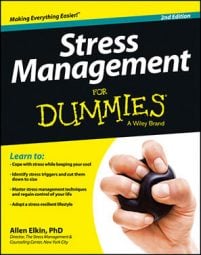You might find that anger, frustration, and impatience are actually causing chronic stress for you. If this is the case, you can practice lengthening your fuse, and learn to reduce your own feelings of anger and stress.
No one likes frustration. But, unfortunately, frustration is an integral part of your life. When faced with a frustrating situation, you may find that you overreact too quickly, becoming too angry too fast. If so, your fuse is way too short.
One way of better tolerating frustration is to “do the opposite.” This technique may sound a little far-fetched, but it really works.
For example, suppose you’re having trouble falling asleep. Try not to fall asleep, and you may be surprised by how quickly you fall asleep. Therapists call this approach paradoxical intention, and it can help you overcome some of your excessive anger. Try some of the following suggestions:
Find a longer line. If waiting in line triggers your anger, the next time you find yourself waiting in line, try moving to an even longer line.
Stay in a slower lane of traffic. If you get angry when you’re stuck in a stalled line of traffic, see if you can find a slow line the next time you’re driving.
Pick the most inept sales clerk. The next time you need some help to purchase something, see if you can spot the newest, most inexperienced, and most inept salesperson.
Now, when you’re in these unusually difficult situations and you find your anger level rising, do the following:
Practice some deep breathing to relax your body.
Repeat to yourself, “This is not the end of the world. I want to get a handle on my anger. This is only a hassle. I can cope with this.”
And indeed you can.
The anger two-step works like this:
Step 1: It starts when someone criticizes, rejects, or otherwise disapproves of you. You personalize this, feel bad about yourself, and put yourself down, feeling discounted, diminished, or disrespected.
Step 2: Automatically, and generally unconsciously, you get angry at the disapproving individual, criticizing or disapproving of him or her.
The upside of this psychological reversal is that you feel better, for a while. Feeling angry is often an easier emotion to live with than feeling bad about yourself. The anger, however, is still misguided, and it can be destructive. Being aware of this emotional dance is your first step in replacing it with better ways of coping.

